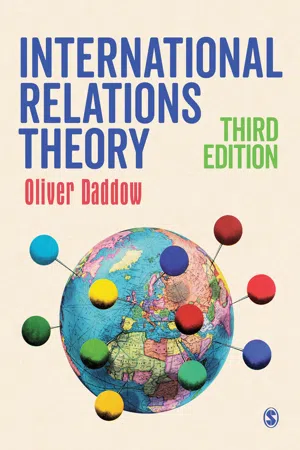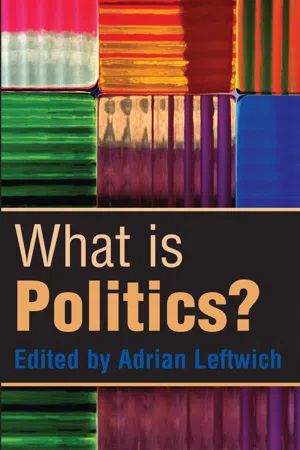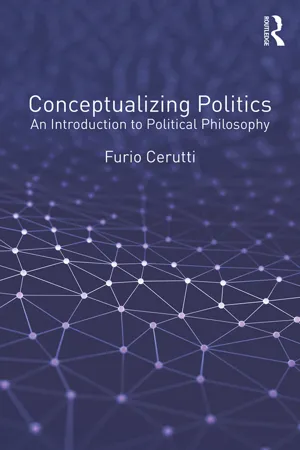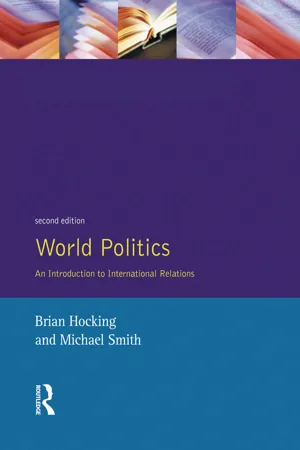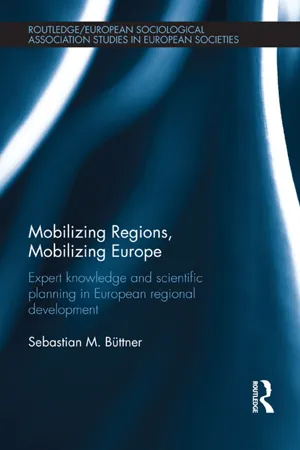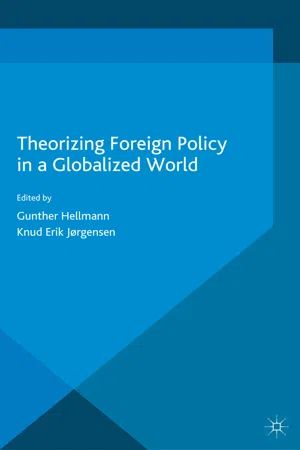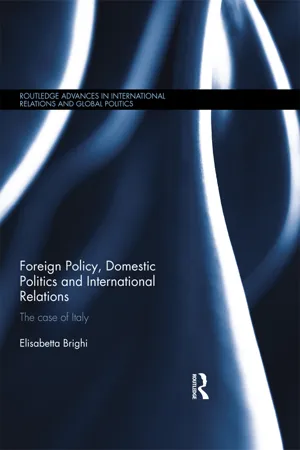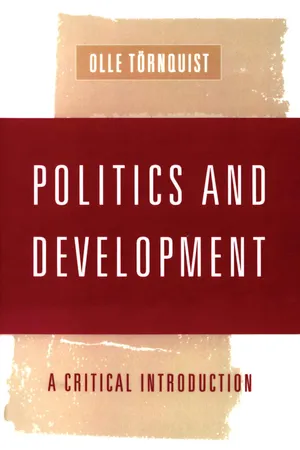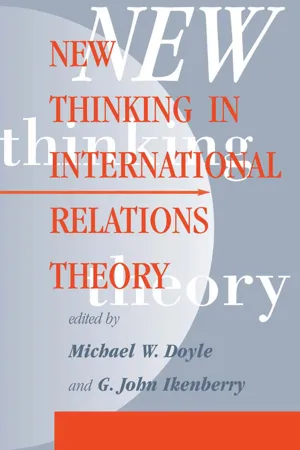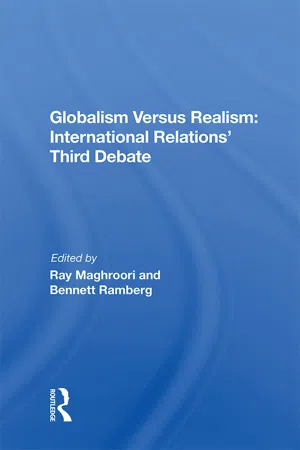Politics & International Relations
World Politics
World politics refers to the interactions and relationships between countries on a global scale. It encompasses diplomatic negotiations, international conflicts, trade agreements, and the pursuit of national interests. The study of world politics examines the dynamics of power, governance, and cooperation among nations, as well as the impact of global events and trends on international relations.
Written by Perlego with AI-assistance
Related key terms
Related key terms
1 of 4
Related key terms
1 of 3
10 Key excerpts on "World Politics"
- eBook - ePub
- Oliver Daddow(Author)
- 2017(Publication Date)
- SAGE Publications Ltd(Publisher)
interdependence and the interactivity between domestic politics and international relations. Part III is on the substantive issues Brown majors on and which Burchill and Linklater incorporate into their list of themes and issues in IR.The upshot of all this is that there is no agreement on what constitutes either the subject area of IR, or how to study this subject. Potentially, it ‘encompasses all phases of human experience because its scope is global and its foci as diverse as the values, preoccupations, and practices of people everywhere’ (Rosenau 2002: 545). Grayson Kirk’s 1947 comment on the state of the discipline is as relevant now as it was then (quoted in Schmidt 2006: 3):the study of international relations is still in a condition of considerable confusion. The scope of the field, the methods of analysis and synthesis to be followed, the proper administrative arrangements to be made in college curricula, the organization of research – all these are matters of continuing controversy.Taking it Further: International Relations or World Politics?In their textbook The Globalization of World Politics, John Baylis, Steve Smith and Patricia Owens (2014a: 2–3) begin by outlining why they use the term ‘World Politics’ rather than ‘International Politics’ or ‘International Relations’ in their book title (see also Viotti and Kauppi 2014: 1).‘World Politics’, they say, suggests something ‘more inclusive than either of the alternative terms. It is meant to signal the fact that our interest is in the politics and political patterns in the world and not only those between nation-states (as the terms internatiopnal relations or international politics imply)’ (Baylis et al. 2008: 2). Their choice of title shows the power of language and labels, and why it is important for us to take both seriously when studying at university level. Let us break down their argument into its constituent parts:- ‘International Relations’ implies the study of relations between nation-states. For greater accuracy we might rewrite it ‘Inter-national Relations’.
- eBook - ePub
What is Politics?
The Activity and its Study
- Adrian Leftwich(Author)
- 2015(Publication Date)
- Polity(Publisher)
This chapter advocates a conception of politics as global politics. It argues that the traditional distinction between domestic and international politics has become a conceptual fiction which, despite its hold on the wider public imagination, no longer reflects the realities of a highly interconnected world. Politics and governance are becoming globalized as the terrorist attacks of 11 September 2001 and the subsequent events vividly demonstrate. As the world confronts a new century, the classic questions of political life have been re-posed with greater urgency, namely: who rules, in whose interests, by what means, and to what purpose? Addressing these questions intellectually, however, requires moving beyond the mythical ‘Great Divide’ – namely the separation of the study of Politics from the study of International Relations – which has fragmented scholarly political analysis since the birth of the modern state. Analysing global politics is a radical endeavour which involves putting the pieces back together, thereby reconstructing in the process the study of Politics and International Relations.In discussing the distinctive form and dynamics of global politics, this chapter will seek to address four key questions:- What is global politics?
- How is global politics to be understood?
- Where does power lie in global politics?
- Why does the study of global politics matter?
2 Politics Beyond Borders: Towards a Global Politics
Some time ago James Rosenau observed that, ‘Politics everywhere, it would seem, are related to politics everywhere else … now the roots … of political life can be traced to remote corners of the globe’ (cited in Mansbach, Ferguson et al., 1976: 22). As this paragraph took shape, the residents of Lee-on-the-Solent, a small English seaside town in Hampshire, could be heard some streets away, protesting against Home Office proposals to place an asylum centre in the town. Political oppression and economic collapse in distant nations have generated controversy in a normally quiescent residential village. By contrast, the Jubilee 2000 campaign brought together a global coalition of aid, development, religious, human rights and women’s organizations from across the North–South divide to campaign for the abolition of Third World debt. Coordinated campaigns within the national capitals of the G7 states (the USA, the UK, France, Italy, Germany, Japan and Canada) and at the G7 summits in the late 1990s forced the issue on to the global agenda and compelled a subsequent G7 policy response. Both these cases are manifestations of contemporary political globalization: namely, the intensification of worldwide political interconnectedness encompassing transnational policy problems, new systems of global regulation, political action at a distance and transnational solidarities. - eBook - ePub
Conceptualizing Politics
An Introduction to Political Philosophy
- Furio Cerutti(Author)
- 2017(Publication Date)
- Routledge(Publisher)
Part IIIWorld Politics and the future of politics
We are now coming a step closer to the full reality of politics by shifting from the singular, the state, to the plural, the states. Since the beginning of politics as a specific human activity, members of the political community had to put their mind to the needs and troubles inside the group as well as to the threats or opportunities coming from the inevitable contact with other groups. Policy has always been essentially foreign no less than domestic policy, as great even if diverging thinkers such as Hobbes, Kant and Hegel – but not their epigones – knew. Globalisation has eventually put an end to the shortsightedness of less recent textbooks, in which politics pretended to be all explained once the origin and the working of the state (singular) had been dealt with.What follows in this Part is therefore not an application of or a marginal addition to the categories we have seen so far, but rather their re-examination within a new context along with new categories that will all lead us not only into the worldwide dimension of politics, but also to a revision, pressed by substantial novelties, of the very notion of politics we made the acquaintance of at the outset of our journey.In this Part we consider two further dimensions of politics: international and global. They are still merged by most authors into one big chapter called ‘international relations’, but I deem the sphere called ‘global affairs’ to have its own specificity, as it will be shown in the following chapters. The first, Chapter 6 , deals with the classical themes of international politics: the nature of international relations, war and peace, and the restraints to war. Chapter 7 - eBook - ePub
World Politics
An Introduction to International Relations
- Brian Hocking, Michael Smith(Authors)
- 2014(Publication Date)
- Routledge(Publisher)
So far, the argument in this book has looked in some detail at several of the foundations for World Politics – where it takes place and between whom, what it is about and what kinds of considerations enter into the policies of those involved in it. It is now necessary to examine what could be seen as the heart of World Politics, as opposed to its body and limbs, and to explore the questions ‘who gets what, when and how?’ in respect of the international system. In doing so, the aim is to identify the forces and factors that operate to produce particular patterns of outcomes and to shape the agenda of World Politics. The remainder of this chapter will draw upon material provided already, and it will also be laying the foundations for later analysis in following chapters.As in the preceding discussion of policy-making, the argument here will start from the assumption that ‘politics between states’ remains a powerful shaping force and a major subject for analysis, but that new combinations and interrelationships between interstate and non-state processes have emerged from the changing world arena. The notion of a ‘mixed actor’ system (or, as it has also been called, a ‘complex conglomerate’ system3 ) conveys the impression of multilayered political activity and of a political context in which the power to shape issues or events is diffused between several types of actors; this is an idea which will be explored in what follows. In particular, the problems of authority and control over events or outcomes will be outlined, although these will be pursued in greater detail in Chapter 11 .Politics between states
The concept of World Politics as politics between states grows naturally both out of the view that the state system is the dominant feature in the world arena, and out of the associated image of foreign policy as state action taken by those acting in the name of the state. It also draws directly on the ideas of sovereignty, recognition and control, both of territory and of transactions, which are central to the state-centric view of ‘actorness’ in World Politics. - eBook - ePub
Mobilizing Regions, Mobilizing Europe
Expert Knowledge and Scientific Planning in European Regional Development
- Sebastian M. Buettner(Author)
- 2013(Publication Date)
- Routledge(Publisher)
Hence, the proponents of world-polity thinking seek for a direct link to the debate on transnational and global integration of world society which has been dominated for a long time by the fields of International Relations and international political economy (cf. Wallerstein 1974; Waltz 1979; Krasner 1983; Jacobson 1984; Keohane 1986; Finnemore 1996a; Wendt 1999). But in marked contrast to common conceptions of ‘polity’ in the political sciences the notion of ‘world polity’ is not just meant in political terms, i.e. as an emerging system of government, a certain (hegemonic) political regime, or even a common ‘(U.N.) state’ on a global scale (cf. Rosenau and Czempiel 1992; Katzenstein 2005; Jessop and Sum 2006). Rather, it is a conceptual vision of ‘world society’ as a highly interdependent, but independent and self-sustaining, social system, which encompasses ‘(…) all aspects of human activities in extensive webs of social interaction and flows of goods, ideas, money, values (…)’ (Boli and Lechner 2005: 20), and not just networks of political interaction or economic exchange.Based on this broader sociological notion of ‘social authority’ (Weber) the ‘world polity’ is conceived of as a distinct social system which is largely exogenous to individual (local) societies, but increasingly institutionalized on a global scale, and continually reified in many different kinds of human activities and by all different kinds of social units (individuals, ethnic groups, companies, associations, states etc.).World society has increasingly taken on a life of its own, transcending even the level of social organization of the dominant national societies, and it enjoys rather strong legitimacy, in part because of the formal equality among all nation-states in the present world.(Boli-Bennett and Meyer 1980: 525)Thus, from the point of view of world-polity analysts the ‘world polity’ is not just driven by organized interests, such as those of national governments and other official political institutions, but by ‘word culture’, the overarching cultural core of the world polity, which increasingly structures and shapes the performances and actions of contemporary social entities, such as individuals, organizations, and even nation-states, as ‘modern’ purposeful actors.World culture – the ‘sacred canopy’ of globalizing modernityThe macro-phenomenological research perspective rests on a very broad, almost monolithic and all-embracing conception of ‘culture’. From this perspective all elements of social life are shaped and structured by culture, even those aspects which are often regarded as distinct, autonomous and largely non-cultural, namely individual purposes and rational interests. Accordingly, ‘culture’ as proposed by proponents of world-polity thinking is constitutive in the sense that it assigns reality to actors and actions as well as to means and ends; and it exhibits a certain signifying function in that it endows actors and actions, as well as means and ends, with constitutive meaning and legitimacy (Thomas et al - eBook - ePub
- Knud Erik Jørgensen, Knud Erik Jørgensen, Kenneth A. Loparo, Knud Erik Jørgensen, Gunther Hellmann(Authors)
- 2015(Publication Date)
- Palgrave Macmillan(Publisher)
transnational perspective that horizontally connects different types of actors (states, intergovernmental and non-governmental organizations (NGOs) etc.) (Held and McGrew, 2002; Rosenau, 2002). Going beyond this notion, however, global also refers to the fact that governance is all-encompassing in its reach: it stretches vertically across levels (from the global to the local) (Rosenau, 2002; Dingwerth and Pattberg, 2006).As an analytical approach, global governance highlights four interconnected constitutive features of current global politics.7Firstly, a global governance perspective emphasizes that World Politics is increasingly multi-actor. States are no longer the only players operating in the global sphere. Rather, many different public and private players – including governmental (for example, the EU, United Nations (UN) bodies) and NGOs (for example, Greenpeace, the US Chamber of Commerce), markets and citizens – co-exist and (try to) determine political outcomes together (Scholte, 2010; Zürn, 2010). While not all actors manage to impact on – or form part of the authority which takes – the decisions in global governance, they all populate the global playing field. Prominent examples of new actor constellations are networks that regroup various types of players and levels of policy-making, and private–public partnerships (Castells, 2000; Koenig-Archibugi, 2002; Beisheim et al., 2010).Secondly, global governance points to the increasingly significant multilevel nature of World Politics (Zürn, 2010). Decisions in global politics can be framed, taken and implemented at several different levels of policy-making, stretching from the global to the local (Held and McGrew, 2002, 9; Dingwerth and Pattberg, 2006). The notion of multilevel governance blurs to a certain extent the clear-cut dividing line between domestic and foreign: what was considered as external and belonging to a different level of policy-making before can become part of the domestic sphere under conditions of global governance. Moreover, it calls into question the assumption that states occupy central roles as ‘frame joints’ in global politics (Rosenau and Czempiel, 1992; Zürn, 2010). Although they may at times still be able to perform such a mediating role between various levels in contemporary World Politics, global governance challenges the view that this constitutes the norm (McGrew, 2004). - Elisabetta Brighi(Author)
- 2013(Publication Date)
- Routledge(Publisher)
1 Foreign policy, domestic politics and international relations A strategic-relational analysisIt is widely agreed that foreign policy occupies a critical, interstitial space in World Politics, produced as it is at the porous interface of domestic politics and international relations. Four generations of foreign policy scholars, often from radically different standpoints, have converged around the idea that foreign policy is a ‘boundary’ activity, straddling disciplinary fields as well as the inside and outside of political actors, generally states. Thus, in 1966 Robert B. Farrell characterised the study of foreign policy as a ‘no man’s land’ at the intersection of Political Science and IR (Farrell 1966: vi). Similarly, in the early 1970s William Wallace argued that ‘the study of foreign policy is a boundary problem’ for both the foreign policy student and practitioner (Wallace 1971: 7). A decade later, James Rosenau famously used the metaphor of a ‘bridge’ to identify the location of foreign policy between the ‘domestic’ and the ‘international’ (Rosenau 1987: 1). In the 1990s David Campbell gave vast popularity to Richard Ashley’s notion of foreign policy as a ‘specific sort of boundary-producing political performance’ separating inside from outside, identity from alterity (Campbell 1998: 62). Most recently, analysts have reiterated the call for a multi-causal analysis of foreign policy able to accommodate sources placed on the inside and outside of states (Eun 2012).- eBook - ePub
Politics and Development
A Critical Introduction
- Olle Törnquist(Author)
- 1998(Publication Date)
- SAGE Publications Ltd(Publisher)
the political processes taking place in the common arena within which political actors operate. The arena and the processes are constituted and limited by the scope, forms and content of politics; that is to say, by the issues that have been politicised, by the political structures, institutions and organisations, and by the predominant ideas and strategies. The political actors then collaborate and compete in their efforts to safeguard various interests and to carry out their plans. And of course their actions have also, in turn, repercussions for the scope, forms and content of politics.Similarly, it is argued, political scientists in the Third World must be free to build independent and empirically well-rooted studies of their own countries without taking norms and theories based on European or North American experiences as points of departure. Serious scholars from outside should adapt to such standards and, to take a contemporary parallel, not repeat the mistake of the experts of the International Monetary Fund, who use the same tool-box and prescribe the same medicine wherever they find themselves.Over the years, and in addition to these primarily intellectual arguments, more detailed and contextualised knowledge of specific Third World Politics has also been in the interests of international agencies, colonial ex-powers such as Britain, France and the Netherlands, post-war dominants like the USA, their regional allies like Australia, and new formations such as the European Union. With globalisation, similar interests have now also spread to small countries like the Scandinavian ones.Taken together, these academic and political trends have paved the way for political science inquiries as well as more interdisciplinary area studies of actual politics (including administration and political ideas) in individual Third World countries and regions. Given the relative lack of knowledge, both types of studies are needed, no doubt – but there are important problems as well. The high esteem of universal theories within many political science departments, even in Third World countries, does not encourage the sufficiently serious kind of empirical studies that are needed, including at the local level, in the field and in co-operation with scholars of other persuasions. Separate country and area studies, on the other hand, are often plagued by the even worse disease of non-comparative and non-theoretical empirical explorations. And a basic problem in both institutional frameworks, and in both the North and the South, is that studies of Third World Politics often continue to depend on external funding and interests in politically and economically ‘relevant’ topics, thus making intellectual and concerned ventures somewhat troublesome.11 - eBook - ePub
- Michael W Doyle(Author)
- 2018(Publication Date)
- Routledge(Publisher)
7 Realist International Theory and the Study of World PoliticsJOSEPH M . GRIECOFor almost half a century—since the publication in 1948 of the first edition of Hans Morgenthau's Politics Among Nations —realist international theory has been at the heart of the study of World Politics in the United States.1 Many scholars have found realist theory to be a useful framework within which to investigate World Politics. This is because realist theory addresses the key questions in international relations: What are the causes of conflict and war among nations, and what are the conditions for cooperation and peace among them?2 Precisely because it engages these fundamental international problems, other scholars, seeking to develop alternative analytical approaches to international affairs—for example, different types of liberal institutionalism, domestic structural analysis, group decisionmaking theory, individual cognition and personality theory, and most recently, postmodern constructivism—have often defined their theoretical perspectives and research programs in large measure through their opposition to one or more elements of realist theory. Hence if we wish to understand the development and current status of academic discourse in the United States on international relations, we need to understand realist international theory and confront its analysis of World Politics.In this chapter I present a critical appreciation of realist international theory. The first main section provides an outline of realism's main assumptions about states, and the central propositions that realists derive from these core assumptions about the preferences and behavior of states in world affairs. In the second section I examine a sampling of realist-informed scholarship in the fields of international political economy and international security studies in order to assess the degree to which realist theory has contributed to our understanding of international relations. The view put forward in that section is that realism does in fact provide substantial leverage on many aspects of World Politics. However, in the third and final main section of the chapter I identify two serious conceptual ambiguities and tensions in realist theory and offer a discussion of possible lines of analysis that might address these problems and thus allow realist theory to provide a more effective understanding of politics among nations. - eBook - ePub
Globalism Versus Realism: International Relations' Third Debate
International Relations' Third Debate
- Ray Maghroori(Author)
- 2019(Publication Date)
- Routledge(Publisher)
1 Introduction: Major Debates in International Relations RAY MAGHROORIIn this chapter, Maghroori explores three definitional debates that have shaped the field of international relations since it emerged as a distinct discipline over sixty years ago. The realist-idealist debate of the interwar period focused on the means of maintaining world order–power politics versus collective security. The traditionalist-behavioralist dialogue of the 1950s and 1960s addressed methodological questions, but in the late 1960s a third debate arose that continues this day. It involves "realists"– those who conceptualize world affairs in terms of power politics–and "globalists"–those who argue that political and economic interdependence and integration are transforming international politics.The study of international relations as a distinct discipline is a relatively recent development, although such antecedents as diplomatic history and international law have long traditions. Movement toward a comprehensive and systematic examination of international relations began only with World War I.1 The war shook many of the dominant ideals about the correct conduct of global politics, and the discipline of international relations took shape during a period of profound change in attitudes about world affairs. This undoubtedly contributed to the introspection and controversy that have marked the growth of the field. Since the close of World War I, two extensive debates have taken place. The first was evidenced by the clash between the realists and the idealists. The second involved the traditionalists and the behavioralists.The realist outlook rested on the simple proposition that the pursuit of national power was a natural drive and that those who neglected to cultivate power actually invited war. The realists further assumed that the community of states, composed of individual actors attempting to maximize their own power, influence, and fundamental security, would be naturally drawn into transitory alliances that would in turn tend to impose a certain balance of power among opposing blocs of states. Thus, the realists upheld the sovereign nation-state's right to pursue power and relied on a balance-of-power system to constrain the competition among states. The scope, duration, and social costs of World War I rendered most, if not all, of the realists' arguments unacceptable. In particular, the notion that sovereign states were entitled to unrestrained independence lost popularity, and the balance-of-power system was rejected as unserviceable. A new school of thought arose that called for the renunciation of war as a national policy, the institutionalization of an international order, and the replacement of balance-of-power politics by collective security.
Index pages curate the most relevant extracts from our library of academic textbooks. They’ve been created using an in-house natural language model (NLM), each adding context and meaning to key research topics.
Explore more topic indexes
Explore more topic indexes
1 of 6
Explore more topic indexes
1 of 4
